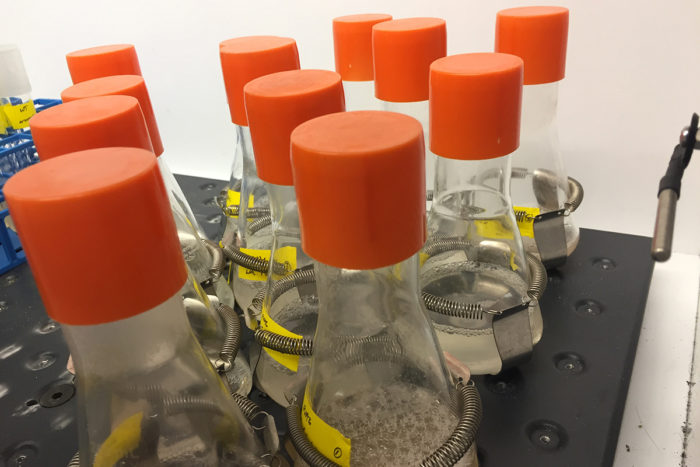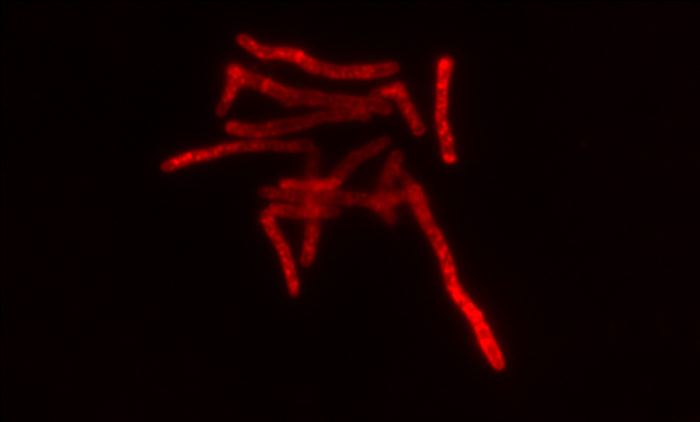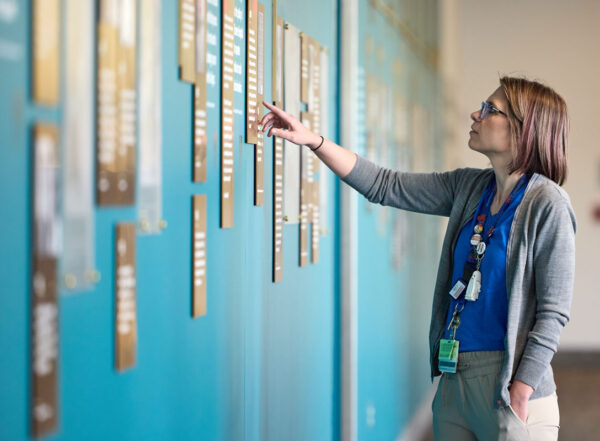$3.9 million supports research to turn bacteria into biofuel producers
Medical, engineering schools team up to create biofuels independent of food crops
 William R. Henson
William R. HensonA team of Washington University researchers is engineering bacteria to manufacture biofuel. Pictured are cultures of bacterial strains that can turn toxic compounds into the precursors of biofuels.
Researchers at Washington University in St. Louis have received a $3.9 million grant from the Department of Energy (DOE) to develop bacteria that manufacture renewable biofuels — energy sources made from plants or microbes.
The researchers, representing a collaboration of investigators at the School of Medicine and the School of Engineering & Applied Science, seek to make biofuels whose production would not compete with the food supply. For example, ethanol is an alcohol-based fuel typically made from corn or sugar cane. Instead, the researchers will engineer microbes to make biofuels from a toxic waste product of papermaking called lignin.
In addition to using a bacterial species and raw materials not involved in food production, another goal of the project is to produce biofuels that could totally replace petroleum-based fuels. Today’s cars can burn fuel that contains 10-15 percent ethanol. But specialized engines are required when the fuel blend is mostly or entirely alcohol-based fuel. Renewable biofuels that are chemically indistinguishable from fossil fuels — such that they could replace current petroleum fuel within the country’s existing automotive fleet — would be a major development.
The grant supports research in five Washington University labs, including those led by co-principal investigators Gautam Dantas, PhD, an associate professor of pathology and immunology; Tae Seok Moon, PhD, an assistant professor of energy, environment and chemical engineering; Marcus B. Foston, PhD, an assistant professor of energy, environment and chemical engineering; Yinjie Tang, PhD, an associate professor of energy, environment and chemical engineering; and Fuzhong Zhang, PhD, an associate professor of energy, environment and chemical engineering. Hector Garcia Martin, PhD, of Lawrence Berkeley National Laboratory, is another collaborator.
The researchers are studying a type of bacteria called Rhodococcus opacus, originally discovered growing on toxic compounds outside a chemical plant. These bacteria thrive on these toxic compounds, using them as a source of food for the production of biofuels.
 W.R. Henson, A.Y. Kau
W.R. Henson, A.Y. Kau“We are taking advantage of the fact that the compounds that R. opacus grows on are not just random toxins,” Dantas said. “These compounds are related closely to lignin, complex polymers that make up roughly 30 percent of plant matter. Our team is using a combination of chemistry, systems biology and synthetic biology to try to process lignin plant matter into biofuels that can be added directly to current petroleum-based engines.”
Millions of tons of lignin are generated yearly from papermaking and lignocellulose-based biofuel industries. Currently, the value of lignin is restricted to its application as a fuel for on-site boiler operations. This project seeks to expand its uses.
The Foston lab is focused on developing chemical transformation processes that extract lignin from biomass, breaking apart that lignin into a form that can be “fed” to the bacteria. Lignin is a large and complex molecule designed to give plants mechanical stability and protect them from attack. Therefore, special conditions such as the presence of a catalyst and the application of heat and pressure are required to break apart lignin. The goal is to create a flexible process that generates compounds R. opacus essentially likes to eat.
The Moon lab is focused on optimizing the different strains of R. opacus through adaptive evolution and the use of synthetic biology tools. The researchers are growing the bacteria in these lignin-based compounds, making the compounds progressively more toxic with each generation, selecting for microbes that are becoming increasingly efficient at processing the compounds. More importantly, according to Moon, his team is developing the synthetic biology tools needed to engineer and improve R. opacus strains for fuel production.
The Dantas lab is focused on sequencing the DNA and RNA of R. opacus as it adapts to more efficiently process the raw (and toxic) biomass. As the microbes evolve, the researchers will identify patterns in genes and metabolic pathways that are the most important to the processing of the compounds and that are the easiest to genetically engineer so that in the future these pathways could be “dialed up” without waiting for generations of the bacteria to adapt and evolve.
The Tang and Garcia Martin labs will use computer models and machine learning to map the interconnecting networks of genes and metabolism and predict what the microbe will do under a given set of circumstances. One little change could propagate through the network and result in multiple changes to the resulting compounds that the microbe produces. Understanding these networks could allow for fine-tuning of the bacteria to make use of changing sources of biomass.
The Zhang lab is taking the compounds made by the bacteria and processing them into refined forms of fuel that so closely resemble petroleum or diesel, they could be pumped into vehicles that are on the road today. The fuel must mimic a final product that typically requires millions of years of degradation to achieve.
While the process to manufacture this biofuel likely would be energy-intensive, at least initially, the researchers said that it would not require drilling and that the burning of the fuel itself would be carbon-neutral.








